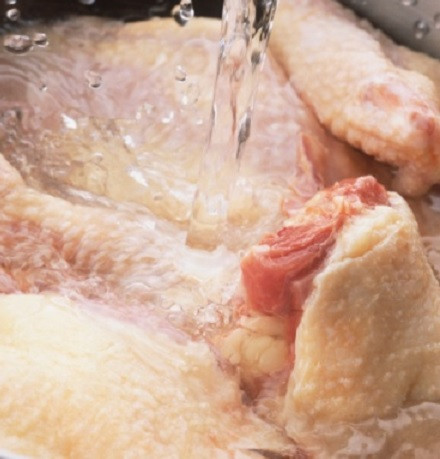UK Supermarkets Launch Emergency Inquiries Over 'Contaminated Poultry' Fears

Three leading supermarkets have launched emergency investigations following "serious allegations" of hygiene failings within the poultry industry.
The allegations, made by the Guardian, concern factories, farms and an abattoir and involve 2 Sisters Food Group and Faccenda - two of the UK's largest poultry processors that supply chicken to Tesco, Sainsbury's, Aldi and Nando's.
Asda was also named but a spokesperson for the supermarket said the company doesn't take any products from 2 Sisters' Scunthorpe site, while the Anglesea site was a small, secondary supplier.
Whistleblowers claim strict hygiene standards have been breached, heightening the risk that the poultry is contaminated with campylobacter, a food poisoning bug that is often found on raw chicken and is responsible for around 100 deaths a year.
The allegations include:
- Chickens falling on the floor and being put back in the food chain at two 2 Sisters sites in Wales. The company denies the claims.
- Scald tanks at the 2 Sisters site not being cleaned for three days, which the company claimed was an "isolated incident" for one day.
- Biosecurity rules to stop the spread of campylobacter in chicken sheds at Faccenda were routinely ignored. Faccenda refutes the claim, which was made by an ex-employee.
The Guardian says it has been gathering evidence for six months and claims to possess film and photographic evidence of the alleged malpractice.
In an emailed statement to IBTimes UK, Faccenda said: "We recognise the food safety challenge posed by campylobacter and the concerns of consumers in this area.
"Through our Campylobacter Action Plan, Faccenda Foods continues to invest significantly across the whole supply chain to address this top priority issue. Our investment in current projects to tackle campylobacter is in excess of £1m."
2 Sisters wrote on its website that the claims were "untrue, misleading and inaccurate", adding: "There is no campylobacter contamination or problems at our sites, as confirmed by multiple independent external audits and our own rigorous testing.
"We strongly deny and defend ourselves against these allegations. Our company's heritage is steeped in the poultry sector. We are extremely proud of this heritage and our excellent track record as a poultry processor and we will remain so. We are doing more than any other business in addressing the key issues our sector is facing and we are leading the way in establishing and enforcing industry best practice."
Tesco said: "We take these allegations of poor practice against one of our suppliers extremely seriously and have launched an immediate investigation.
"Customers can be assured that we conduct our own stringent quality checks on fresh chicken received from suppliers before it is placed on shelves, so we can be confident that it meets our very high quality and safety standards."
Sainsbury's said: "Customers can be confident in the safety of products bought from our stores. We perform regular independent and in-house checks to ensure these standards are met and are investigating these allegations with 2 Sisters."
M&S said: "We take food safety very seriously and regularly audit all of our suppliers to ensure they meet our strict codes of practice. We do not tolerate any alleged breach of our standards and have launched an immediate investigation into these allegations."
Asda said: "Food hygiene and safety is incredibly important to us and our customers should be confident we take any concerns extremely seriously. We're in discussions with our suppliers regarding these allegations."
Both Nando's and KFC were reportedly confident that their suppliers operated to high hygiene and welfare standards, while Aldi said it is taking the claims "very seriously".
The Food Standards Agency has also launched an inquiry but has refused to disclose campylobacter rates in supermarkets and processors over fears it could provoke a food scare similar to the salmonella scare around British eggs in the late 1980s.
Erik Millstone, a food safety professor at Sussex University, however, criticised the agency's decision, saying: "In the last few years, the Food Standards Agency has been under a great deal of pressure from the government and the food industry to ensure that it only provides reassuring messages and especially that it should say nothing that could provoke any 'food scares'.
"But the FSA was created to protect consumers, not to protect the food industry, or to give ministers a quiet time. This decision shows that its independence is entirely illusory."
© Copyright IBTimes 2025. All rights reserved.






















